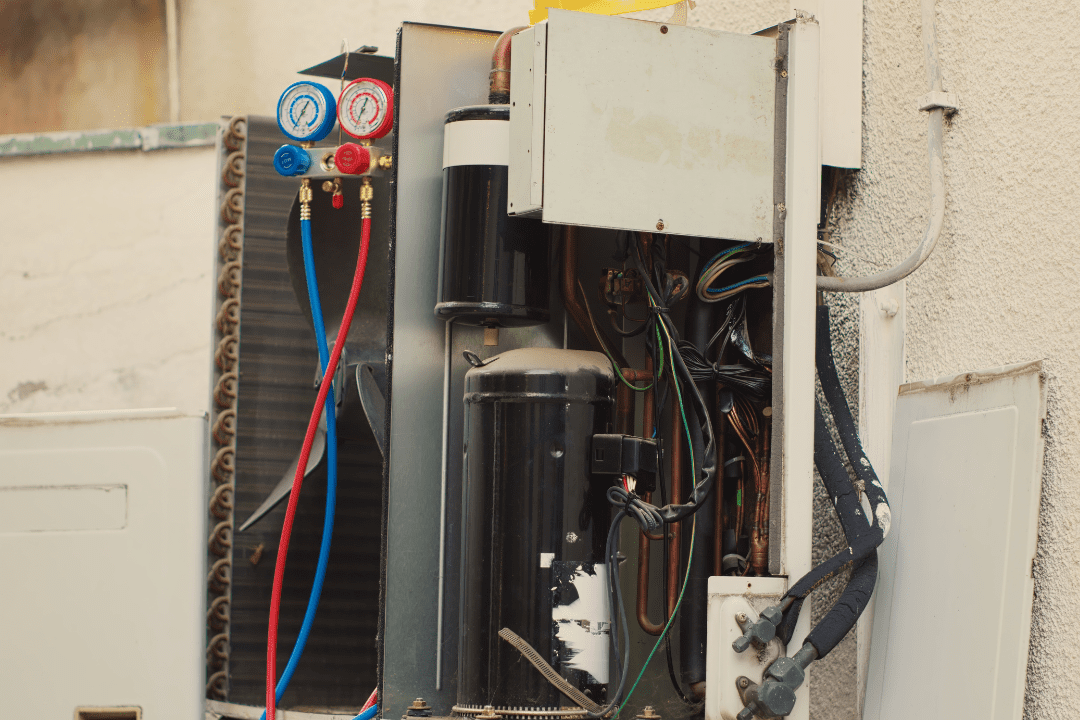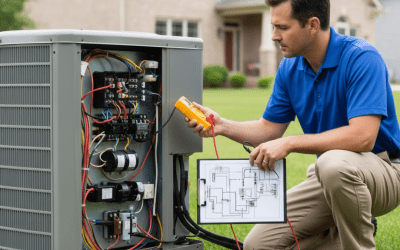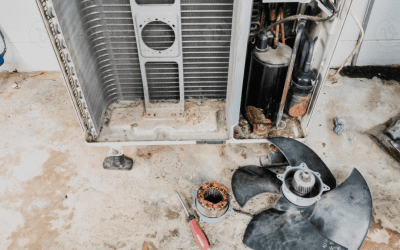An air conditioner’s compressor is one of its most vital, and expensive, components. It’s responsible for pressurizing the refrigerant and keeping cool air flowing through your home. When it starts to fail, the entire system can suffer, often leaving you with rising temperatures and rising repair bills. AC compressor failures typically don’t occur overnight. They develop over time due to issues such as electrical faults, low refrigerant levels, overheating, or poor maintenance. Knowing what causes these failures, spotting early signs of AC compressor failure, and what your options are when things go wrong can make all the difference.
In this blog, we’ll explore all these things in detail to help you uncover options to help extend the life of your air conditioning system.
What Does the AC Compressor Do?
The AC compressor plays a central role in your HVAC system by acting as the engine that drives the refrigerant cycle. Located in the outdoor condenser unit, the compressor is responsible for compressing low-pressure refrigerant gas from the evaporator coil into a high-pressure, high-temperature gas. This transformation allows the refrigerant to move efficiently through the system, releasing heat at the condenser coil and absorbing it again at the evaporator coil inside the home.
In technical terms, the compressor increases the enthalpy of the refrigerant, allowing it to transition through its phases and complete the thermodynamic cycle. Without this process, the system cannot maintain a consistent heat exchange, and cooling performance suffers drastically. The compressor must be precisely calibrated to the system’s tonnage and refrigerant type, typically R-410A or R-22 in older units, to function correctly.
Common Causes of Compressor Failure
Now moving forward to what causes AC compressor failure, these are some of the often noted factors:
Refrigerant Issues
Incorrect refrigerant charge, whether too much or too little, can strain the compressor. Low refrigerant levels may lead to overheating, while overcharging can raise system pressure beyond safe limits, damaging internal components. Contaminated refrigerants can also introduce debris or moisture, compromising performance and accelerating wear and tear.
Electrical Failures
Faulty wiring, failing start or run capacitors, or voltage imbalances can burn out the compressor motor’s windings. These electrical issues often go unnoticed until irreversible damage has occurred, making regular diagnostics critical.
Poor Lubrication
The compressor relies on proper lubrication to reduce friction between moving parts. If the oil degrades, leaks, or fails to return properly from the evaporator, internal components can grind and seize, eventually leading to failure.
Overheating from Dirty Coils
Clogged or dirty condenser coils restrict heat dissipation, forcing the compressor to work harder and run hotter. Prolonged overheating significantly reduces the compressor’s operational life.
Slugging
Slugging occurs when liquid refrigerant, rather than vapor, enters the compressor. This can damage pistons, valves, and internal seals, often due to faulty expansion valves or incorrect system charging.
Improper Installation or System Mismatch
Incorrect line sizing, improper refrigerant type, or poorly matched system components place excess stress on the compressor. This can result in reduced efficiency, premature wear, and eventual failure.
Signs of A Malfunctioning AC Compressor
Here are the most common warning signs:
Reduced Cooling Performance
One of the first noticeable signs is insufficient cooling or warm air blowing from the vents. A weak or failing compressor cannot pressurize the refrigerant effectively, resulting in poor heat exchange and subpar cooling output.
Loud or Unusual Noises
Grinding, rattling, or screeching noises coming from the outdoor unit may indicate internal mechanical damage or a loose component within the compressor. This is often a sign that internal parts are wearing out or that the motor is struggling to operate.
Frequent Hard Starts or Tripped Breakers
If your system struggles to start or causes circuit breakers to trip repeatedly, the compressor may be drawing too much current due to internal damage or electrical failure. This is often a sign of motor overload or a failing start capacitor.
Compressor Clutch Not Engaging (for split systems)
In systems with a clutch mechanism, such as those found in HVAC units for vehicles or specific residential models, failure of the clutch to engage often indicates that the compressor is not receiving the correct signal or is internally damaged.
Visible Damage or Oil Leaks
Physical signs such as oil stains around the compressor casing or signs of burned wiring can indicate internal failure or refrigerant leakage. These visual cues often accompany declining performance and should be inspected by an HVAC technician immediately.
Repair Vs Replace: What Should You Do?
If your HVAC system is less than 10 years old and the problem is isolated, such as a failed capacitor, faulty starter relay, or damaged wiring, fixing an AC compressor issue may be the most cost-effective solution. These components work closely with the compressor to help it start and run properly, so repairing or replacing them can often restore your system without the need for a full compressor replacement.
However, when the damage is extensive or involves internal mechanical failure, the AC compressor replacement cost can be significant, often approaching the price of a new system. Replacing the entire outdoor unit may provide better long-term value, especially for systems still using outdated refrigerants like R-22.
Also, older systems that use discontinued refrigerants, such as R-22, are more expensive to maintain and less efficient. In such cases, upgrading to a modern, energy-efficient unit can reduce utility bills and offer a more reliable cooling solution over time.
To make an informed decision, you can refer to our guide to AC repair components and how they affect cooling efficiency. This helps clarify how each part, from compressors to coils, impacts overall system performance and long-term cost savings.
Notable Tips To Prevent Compressor Issues
Schedule Annual HVAC Maintenance
Have your system evaluated by a trained HVAC expert at least once a year to ensure peak performance and efficiency. Preventative tune-ups help catch early signs of wear, test electrical components, and clean essential parts, such as coils and fan blades.
Maintain Proper Refrigerant Levels
An incorrect refrigerant charge can strain or damage the compressor. Always rely on EPA-certified technicians for refrigerant handling to ensure safe and precise charging.
Replace Air Filters Regularly
Dirty or clogged filters restrict airflow, making the compressor work harder. Replace filters every 1–3 months, depending on usage and the quality of indoor air.
Clean the Condenser Coils
Outdoor condenser coils should be kept free of dust, leaves, and other debris to ensure optimal performance. Clean coils allow proper heat transfer and help prevent compressor overheating.
Check for Electrical Irregularities
Be alert to flickering lights, tripped breakers, or buzzing from the outdoor units, as these are signs that the AC compressor is not turning on or operating correctly.
Keep the Outdoor Unit Clear
Ensure that the area around the outdoor unit has at least two feet of clearance for proper ventilation and airflow.
Conclusion
Now that you know “what does an AC compressor do”, the causes behind its failure, and warning signs, with regular maintenance and early intervention, you can avoid costly breakdowns and extend the life of your air conditioner. If you’re experiencing compressor issues, want a professional inspection or full-fledged AC repair in New Braunfels, San Antonio, TX, or surrounding areas, trust the experts at Classic Services Air Conditioning & Heating. Our certified technicians provide prompt, honest, and high-quality service to keep your home or business cool and comfortable throughout the year.






